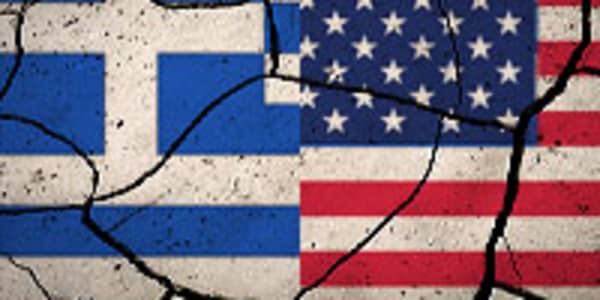Greece’s best chance of survival may be to stay in the euro but opt for its own parallel currency or “Geuro,” according to Deutsche Bank’s head of research, Thomas Mayer.
In a research piece, Mayer said the Geuro would help Greece balance its primary budget without financial support from the 'Troika' of international lenders (the International Monetary Fund , the European Union and the European Central Bank ). This would allow the incoming Greek government to reject the strict austerity program on which aidis contingent.
“A plausible response of the Greek government to the shortage of euro cash, as a result of the end of financial transfers, would be to issue debtor notes to its creditors, promising payment as soon as fresh euro cash would be available,” Mayer said.
“As creditors lacking euro cash would have to use the IOUs to settle their own bills, these instruments would assume the role of a parallel currency (let’s call it Geuro),” he said.
Mayer said the Geuro would allow Greece to devalue its currency without formally exiting the euro and readopting the .
“Initially we would expect a large depreciation, but the Greek authorities would have the power to stabilize or even strengthen the exchange rate of the Geuro against the euro, via prudent fiscal policy and structural reform, so as to keep the door open to a future return to the euro,” he said.
Mayer added that the Troika did not need to “give in” to Greece’s demands for unconditional financial aid out of fear of European or global economic chaos.
“Ensuring debtservice payments and the survival of the banking sector would in our view be enough to avoid a catastrophe when financial assistance to a non-compliant Greek government is stopped,” he said.
In an interview with CNBC’s 'Squawk Box Europe' on Wednesday, Mayer said the best way to protect Greece’s banks would be to create an EU-led 'bad bank', run along the lines of Ireland’s National Asset Management Agency (NAMA), which was established in late 2009 to purge banks of toxic real estate loans.
“The risk of a bank run would be reduced,” said Mayer. “If you take the Greek banks into a European bad bank, it would protect the Greek population from the worst, and would also protect Greek depositors.”
Mayer added: “The idea of taking the Greek banks into an European bad bank would be the beginning of the so-called banking union that many people, including myself, argue that we need, i.e. a banking union where you have banking supervision, bank restructuring resolution, but also deposit insurance at a European level.”
By CNBC.com's Katy Barnato



